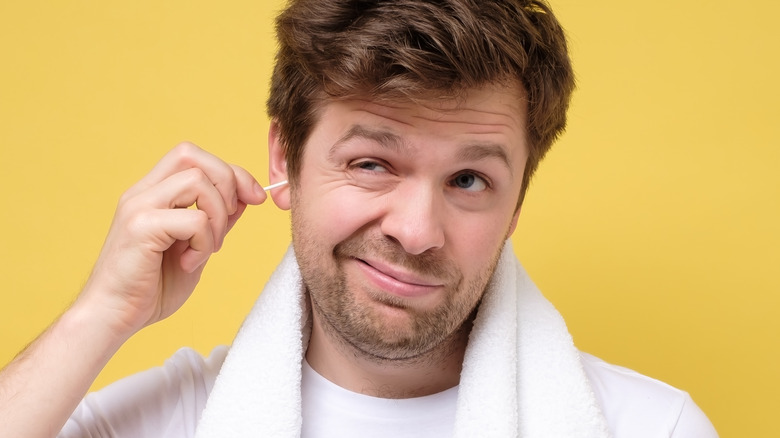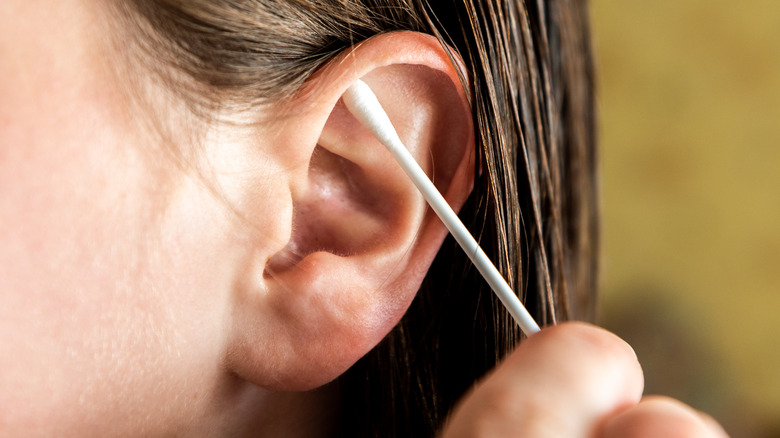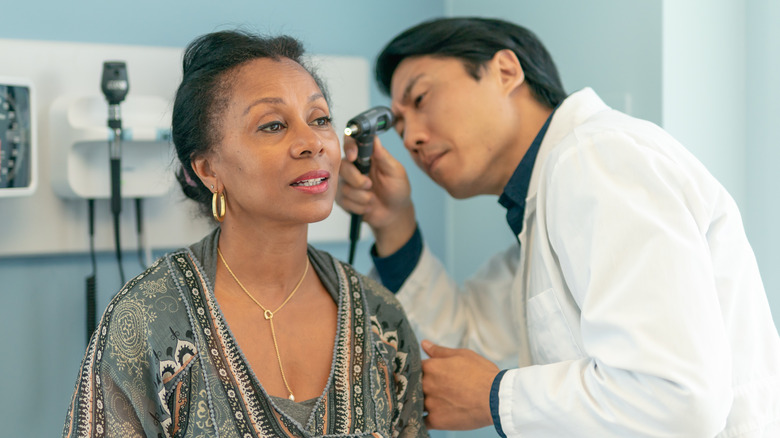The Real Reason You Have So Much Wax In Your Ears
Earwax may not be everyone — or anyone's — favorite thing to talk about, but in a creepy, gross-you-out sort of way, it's actually fascinating. That sticky, waxy substance that we cringe over is not only completely normal and natural, but it's vital for good ear health. "People think of earwax as something dirty, but it isn't," Dr. Linda Dahl, an otolaryngologist in New York City, told Well+Good.
Wax glands in the outer part of the ear canal (the tube that connects the fleshy outer ear to the eardrum) secrete a sticky, waxy substance that is largely made up of fat (via Everyday Health). This combines with dead skin cells, normal bacteria, water droplets, and hairs, to form earwax.
Earwax plays an important role in lubricating the ear canal, fighting off infections, and protecting the delicate eardrum from dirt and other debris that might enter the ear. Normally, it functions pretty efficiently as the ear's own self-cleaning system. As a result of jaw movements, earwax gradually moves toward the outer part of the ear until it eventually falls out or is washed out (via Verywell Health). But what happens if your body produces too much earwax?
Stay safe by cleaning only the outer part of the ear
For certain reasons, some people produce an excessive amount of earwax, which can lead to problems like ear pain and hearing loss. Even those of us who have perfectly "normal" ears are likely to get a buildup of earwax once in a while. "Almost everyone at one point gets an earwax blockage where they have a sense they can't hear or water is getting stuck in there," Dr. Dahl told Well+Good.
When that happens, doctors are unanimous on one thing — be very careful if you choose to try to clean it out yourself, and by all means, don't insert anything with a pointed end into your ear canal. Not only could you push the wax more deeply into your ear, but you could also damage your delicate eardrum.
Normal earwax doesn't need to be removed, but if you're uncomfortable or just feel the need to clean your ears as a part of personal hygiene, stay safe. Gently wipe only the outer part of the ear using a washcloth or cotton swab. If you think a deeper cleaning is necessary, check with your doctor to have it done professionally.
Who tends to be more prone to excess earwax?
Why you might have more wax in your ears than somebody else may simply come down to your genetics, Dr. Maura Cosetti told HuffPost. Additionally, your age could also have something to do with it. As we get older, our ear canal progressively droops and narrows, making it more likely for earwax to get stuck and build up. Similarly, people with an anatomically smaller ear canal or those with an abundance of hair in their ears may also notice they have a greater amount of earwax.
Individuals with certain health conditions may also find excess wax hiding out in their ears, such as those who deal with ear infections on a more regular basis. After a swimmer's ear infection, for example, the body recovers by ramping up cerumen production, which is why you might have more wax than usual. Referred to as otitis externa, Mayo Clinic experts explain that swimmer's ear happens when water gets trapped in the outer ear canal and can result in bacterial growth. More mild symptoms include itching, minor redness, or discomfort, as well as a minimal amount of clear discharge. In more severe cases, a person may experience extreme pain, total ear-canal blockage, and lymph node swelling in the neck. In the event of symptoms, reach out to your physician. Alternatively, people with cases of eczema or psoriasis within the ear may also be more prone to an excess of earwax in the ears.



